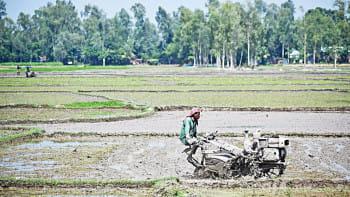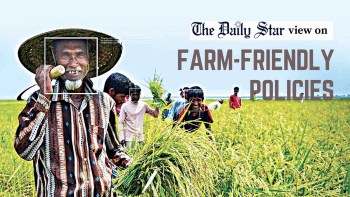Why is the irrigation water crisis not getting due attention?

With all three pumps of the Ganges-Kobadak (GK) Irrigation Project out of order, hundreds of thousands of farmers in Kushtia, Chuadanga, Jhenaidah and Magura, who depend on water from the GK project for irrigation, are in a deep crisis as they are not getting the irrigation water they need for Boro cultivation. The GK project is the largest surface irrigation system in the country set up by the Bangladesh Water Development Board (BWDB) on the bank of Padma (Ganges). According to Banglapedia, the project covers 197,500 hectares, of which 142,000 hectares are net irrigable and are under the jurisdiction of Kushtia, Chuadanga, Jhenaidah and Magura districts. Under this project, water is pumped from the Padma River and distributed to the fields using the canal system that stretches 1,655 km. Three main pumps with a designed capacity of 37 cumec (cubic metre per second) each and 12 subsidiary pumps with a capacity of 3.5 cumec each are used for pumping water from the river to the canal.
Because of the Farakka Barrage, it is often not possible to pump the required water from the Padma during the dry season, as during that time water levels are way below the level for which the pumps have been designed. As Padma's water level has fallen, water supply has been kept normal only in Kushtia and Chuadanga during the Boro season, while water flow to the canals in Magura and Jhenaidah has been kept shut for several years. Moreover, according to the BWDB, the condition of the project's physical infrastructure has deteriorated gradually due to insufficient funding for proper maintenance.
Out of the three pumps in the project, pumps 2 and 3 have been out of order for the past few years. The 12 subsidiary pumps also have been out of order since 2001. In such a situation, when the only working pump went out of order on February 19 this year, the supply of irrigation water was completely stopped. BWDB officials cannot say when the water supply will resume. Representatives of the farmers have been told to make their own "arrangements" for irrigation.
Thus, hundreds of thousands of farmers are suffering due to lack of investment in timely maintenance of the GK project. As an alternative, some are trying to lift water with the help of shallow machines, but the cost of irrigating one bigha with water from the GK project is Tk 300 per year, while the cost of lifting water from underground to irrigate the same area of land is about Tk 5,000. As a result, many farmers are unable to start cultivation on time. Facing the risk of a decline in this year's Boro harvest and huge losses for themselves.
Farmers in the Barind region have also been suffering from irrigation water shortage for a long time due to the depletion of Padma water and uncontrolled extraction of underground water using deep tube wells. The groundwater level has dropped especially in 21 unions of Rajshahi, Naogaon and Chapainawabganj. As a result, on the one hand, adequate water is not available from the deep tube wells under the irrigation project for the Barind region, while on the other hand, farmers are being deprived of the fair share of the little water that is available. That's why they are forced to cultivate other crops instead of rice.
Farmers are not getting enough water on time due to irregularities and corruption by operators of the pumps from which water is available. According to the rate fixed by the Barind Multipurpose Development Authority (BMDA), farmers are supposed to pay Tk 125 per hour for a two cusec (cubic foot of water per second) pump and Tk 110 per hour for a one cusec pump. But in most cases, farmers are forced to pay more to get irrigation water. There is also no remedy as deep tube well operators are politically appointed. Two years ago, two Santal farmers, Abhinath Mardi (36) and his cousin Robi Mardi (27), died by suicide in Godagari, Rajshahi allegedly after the local tube well operator refused to give them the irrigation water they were entitled to. Yet, the situation has not improved.
Meanwhile, around 50,000 farmers of Brahmanbaria's Ashuganj and Narsingdi's Palash upazilas have been deprived of irrigation water for three years, since the Ashuganj-Palash Agro-Irrigation Project was not renewed upon expiry. As a result, Boro cultivation in 15,000 hectares of land under the project is being disrupted. Under this project, the cooling surface wastewater of power plants, which is collected from Meghna and Shitalakkhya rivers, was used to irrigate the command area of the project. This has been a green project of Bangladesh Agricultural Development Corporation (BADC) since 1992.
When the project was functional, the irrigation cost was only Tk 2,000 per acre, but now the farmers have to spend Tk 8,000-10,000 per acre for irrigation by lifting underground water using deep tube wells. Moreover, surface irrigation would reduce the pressure on underground water and also save 70 percent of energy on average. The BADC proposed a new project worth about Tk 470 crore to keep the irrigation system running, but it has not been approved even after three and a half years.
It is evident that due to long-standing neglect on the part of the relevant authorities, hundreds of thousands of farmers are facing irrigation water crisis in the country. Although the government is spending thousands of crores of taka on various megaprojects, it is not investing adequately and timely to solve irrigation problems faced by farmers for a long time. The country's politics has been dominated by business elites for so long that, although agriculture is very important for the country's food security and employment generation, farmers' interests are not given much priority by policymakers. These problems do not seem to get the attention they deserve as national issues. No wonder farmers' suffering due to the lack of irrigation water is not ending.
Kallol Mustafa is an engineer and writer who focuses on power, energy, environment and development economics. He can be reached at [email protected]
Views expressed in this article are the author's own and do not reflect those of any organisation, institution or entity with which he is associated.
Follow The Daily Star Opinion on Facebook for the latest opinions, commentaries and analyses by experts and professionals. To contribute your article or letter to The Daily Star Opinion, see our guidelines for submission.

 For all latest news, follow The Daily Star's Google News channel.
For all latest news, follow The Daily Star's Google News channel. 






Comments